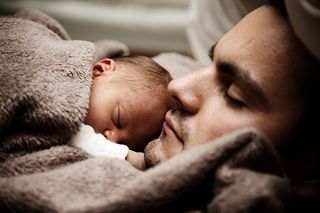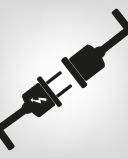Hormones
The Changes and Challenges of Fatherhood
Coping with the psychological and physiological shifts of fatherhood.
Posted June 14, 2018
By Chuck Schaeffer, Ph.D.

Father’s Day, like fatherhood, means different things to each man. For most of the men I work with in my practice, Father’s Day is a reminder of the powerful psychological changes that happened when they became fathers. In my work with new and expecting fathers over the years, I’ve found that while there are different ways men come to understand and adapt to entering fatherhood they all know they are not, and cannot, be the man they were before their child was born. They know they are growing into something new, scary, exhilarating, powerful, hopeful—a father.
Biological and Hormonal Changes
Most of the new fathers I work with know a lot about the biological and hormonal changes their female partner is going through, but little to nothing about their own biochemical and neurological changes. Entering fatherhood is a biological sea change in a man’s life not seen since puberty. Starting a few weeks after childbirth, testosterone levels lower as prolactin, vasopressin, and other hormones increase, rewiring a man's brain to prepare him for fatherhood. Entire areas of a man's brain grow and develop in response to hormonal changes in the first year of a child's life, which equip him with crucial skills to care for a newborn. This includes an increased sensitivity to crying, a deeper capacity to bond emotionally, and a greater responsiveness to another's needs.
While every man responds to these biological and hormonal changes differently, all men report experiencing more awareness of their emotions, of their partner’s emotions, and, most powerfully, of their infant child’s emotions. For some men the return of strong emotional awareness and the needs of a fragile, helpless infant lead to revisiting many emotionally sensitive, expressive, and vulnerable parts of themselves which got cut off or suppressed by enacting traditional male gender roles.
In fatherhood groups, many men often share how their increasing abilities to use these vulnerable, sensitive parts of themselves is often scary and threatening despite the fact that it increases their closeness and positive interactions with their families. For example, in working with “Deshawn”, a new father in his 30s, he discloses how powerful he feels to be able to soothe his nine-month old son back to sleep at night. He goes on to wonder if he’s getting too “soft” and “losing his edge” at work because of all this “daddy stuff.”
Relationship Changes and Loss
Many men don’t realize how much they rely on their partners for primary emotional support and intimacy until it is abruptly lost in early parenthood. The biggest changes often occur in this relationship. Months before the baby arrives, the need to argue, negotiate, and resolve conflicts about parenting takes center stage. At the same time, sex and relational satisfaction are not a priority. For some men the experience of losing the exclusive emotional focus from their partners while going through dramatic hormonal shifts is jarringly similar to how they entered adolescence—and in turn lost childhood. Men often experience long-repressed or unresolved feelings of abandonment and/or loss of connection and care from their own childhood relationships with their parents which are suddenly thrust into their relationship with their partner.
For many this experience of their relationship and their partners causes significant emotional turmoil, sadness, and vulnerability driving them into therapy. In my work with Harry, a 40-year-old new father of twins, he shares how lonely and resentful he has felt since his children “sucked up” all the attention and energy from his wife. He worries about his ability to be a good father when he has so much jealousy regarding the amount of time and care his infant children receive from his spouse versus what he receives from her.
Emotional/Developmental Changes and Healing
While many of the changes that come with fatherhood are like many developmental shifts—confusing, scary, painful, and transformative—entering fatherhood also provides the space for repairing, healing, and growing. Fatherhood offers many men a second chance at revisiting important unmet needs from earlier in development while also providing the opportunity to grow new parts of their identities.
None of the psychological tasks of fatherhood are easy. In my experience they are nearly impossible without support and care. Through individual/group therapy and coaching I’ve seen many men heal, grow, and resolve prior psychological conflicts while becoming fathers.
For example, once Deshawn was able to share more of his worries about becoming too emotional or soft with other fathers in one of my groups, he learned how many of the men in the group also had that worry until they realized how their understanding of manhood had grown and expanded since becoming fathers.
After a few months of treatment Harry came to realize how much his resentment cuts him off from his family and decided to take up more direct childcare and spend more time getting advice and support from other dads he knows. His wife noticed these changes in their relationship, the changes he is making for their family, and she started flirting and being more affectionate with him.
Every man will experience and navigate fatherhood differently yet all will struggle with similar psychological challenges on a biochemical, relational, and intrapsychic level. Through supportive groups, therapy, coaching, and communities we can help new fathers change and heal for the better.
About the Author: Chuck Schaeffer, Ph.D. is a Licensed Clinical Psychologist who is recognized by NY State, Postpartum Support International, Society for Behavioral Sleep Medicine, and New York University for his advanced expertise in applied clinical and counseling psychology. Dr. Schaeffer serves as clinical faculty at NYU and as a clinical consultant to the Motherhood Center of NY, Postpartum Support International, and the American Psychological Association. He received his M.A. and Ph.D. from New York University. You can follow him on Instagram @DrChuckPsychologyNYC or Twitter @TheDrSchaeffer




